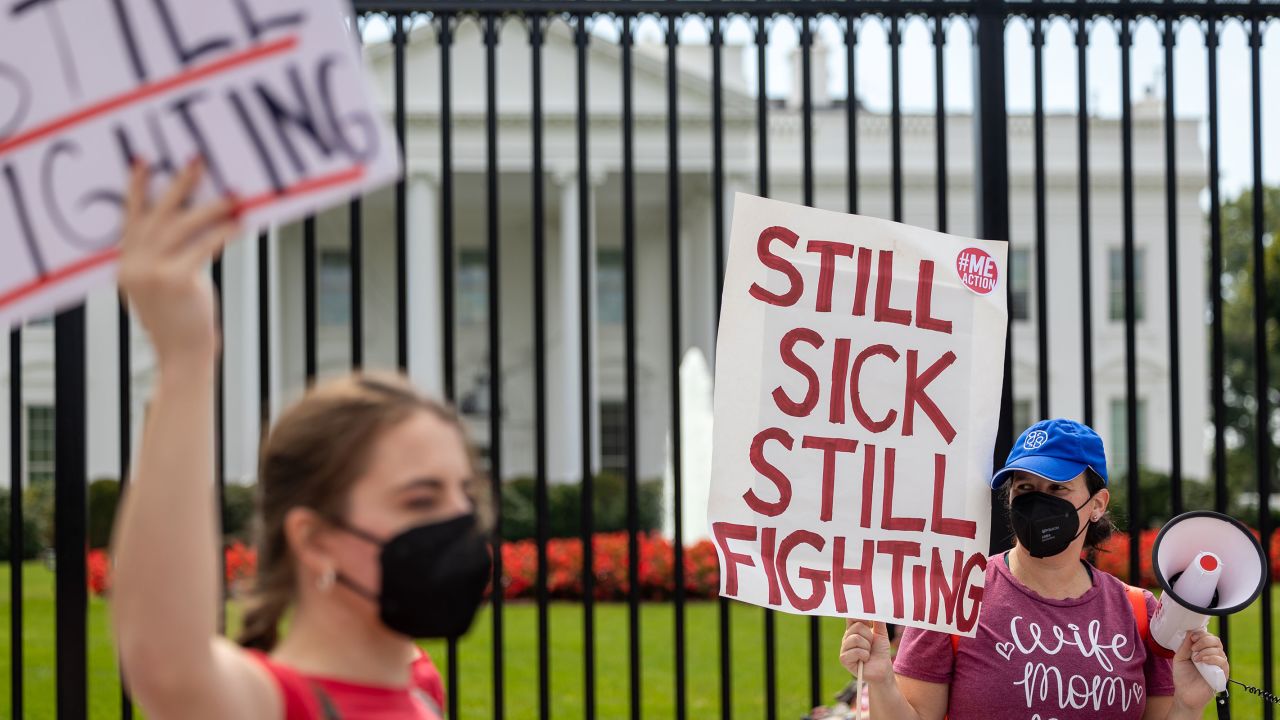Everyone over 6 months should get a new shot, according to the CDC. Should we expect this every year?

www.vox.com
New Covid vaccines are coming out. The CDC wants you to get one.
Everyone over 6 months should get a new shot, according to the CDC. Should we expect this every year?
By
Rachel DuRose@durosettastone Updated Sep 13, 2023, 10:04am EDT
Matthew Horwood/Getty Images
Rachel DuRose is a Future Perfect fellow, covering climate change, housing, mental health, and more. Rachel previously wrote about the workplace, hiring, and executive leadership for Business Insider.
The fall season may finally bring a needed reprieve from the summer heat, but it also creates the perfect conditions for viruses — like SARS-CoV-2 — to thrive.
When the weather gets colder, people spend more time close together indoors (and some
research suggests our frontline immune system responses get worse when it’s cold), which means virus-laden respiratory droplets can spread more easily. It’s likely that come the frigid winter months, Covid hospitalization rates will rise (and we’re already seeing an
uptick in hospitalizations). These hospitalizations line up with a few
dominant variants sweeping the country.
With other measures like masking or social isolation mostly phased out — and unlikely to return — vaccines remain the most effective defense we have against a new Covid wave. But the US isn’t well prepared for a winter surge on that front.
While
69.5 percent of the US population completed their initial series of Covid-19 shots, only 17 percent received the bivalent booster, meant to protect against newer variants, that was rolled out last year.
On Tuesday, a Centers for Disease Control and Prevention (CDC) committee
recommended everyone 6 months or older receive the newest Covid shot, which is specifically designed to target prominent variants of the omicron strain. CDC Director Mandy Cohen
signed off on the committee’s recommendation later that evening. This means the newest Covid shots could be available at pharmacies
later this week.
The recommendation that everyone should get the Covid booster, regardless of their prior vaccination status, prompts a question: Should we start expecting yearly reformulations like we see with the yearly flu shot? And is there any way to boost the number of people who will get a booster?
“We should start viewing this as just this annual booster that we’re going to need, very much like the flu vaccine itself,”
Thomas Duszynski, an epidemiologist with Indiana University’s Fairbanks School of Public Health, said of Covid shots. “We need those vaccines to protect us.”
Despite the CDC’s recent recommendations, not all experts believe a booster will be necessary for everyone every year, particularly young healthy people who have been previously fully vaccinated. In the years to come, the path forward for Covid shots isn’t as clear as the flu vaccines,
which are recommended for pretty much everyone, every year, regardless of their prior vaccination history.
Let’s break it down.
The new boosters, explained
Updated Covid-19 boosters are needed for two fundamental reasons: first, that the virus is continually evolving, and second, that our immunity wanes over time.
Since the pandemic first began in 2020, Covid-19 has evolved and mutated into over
three dozen various strains and variants. (While, colloquially, strain and variant are often used interchangeably, a variant — such as Eris — refers to a form of a virus that
differs only slightly from the original form, while a strain — such as omicron — has distinctly different properties that make it more easily distinguishable from the original virus.) These strains and variants sometimes possess characteristics that can help them evade our weakening immunity, and therefore reproduce better. In turn, scientists are reformulating Covid-19 boosters designed to try to keep up with these mutations — pitting science against viral evolution.
The original Covid vaccines, which became available in the winter and spring of 2021, were monovalent shots — that is, immunizations directed at only one disease strain. The newer bivalent shots that
arrived in 2022 protect against the original strain of Covid as well as omicron subvariants.
The newest vaccine will protect against specific omicron subvariants. In theory, these updated vaccines help immune systems evade the most infectious variants of the moment, and can be used as a first-line Covid vaccine for those who never received the initial immunizations.
The latest data from the CDC shows a
8.7 percent spike in Covid hospitalizations between August 26 and September 2. Many of these cases can probably be credited to the omicron subvariant,
EG.5, (part of the branch targeted by the new booster and informally named Eris), which causes an estimated
21.5 percent of current Covid-19 cases. A new variant (with a significant number of mutations), BA.2.86, nicknamed Pirola, also just
popped onto public health officials’ radars. As Vox’s Keren Landman
reports, the data on Pirola suggests it’s unlikely to lead to a substantial Covid surge on its own.
Vaccines, like natural infections, prompt the body to produce virus-fighting antibodies. These proteins are good at fighting infection, but they don’t stay in our bodies forever. “Your protection is the best in the first three months that you’ve gotten the vaccination or infection,” said
Taison Bell, an associate professor of medicine at the University of Virginia Health.
During that time, you have a lot of new antibodies that can prevent infections from settling in. After a time, the body naturally breaks down
antibodies, like it does all proteins. “It’s antibodies that really prevent mild infection,” said
Paul Offit, the director of the Vaccine Education Center at Children’s Hospital of Philadelphia. “But antibodies are short-lived.”
After a few months, antibodies begin to wane. But
T-cells and
B-cells — other immune system cells that are boosted by vaccination — have long memories, and while they don’t prevent all infections, they do still protect against severe disease.
The bottom line is that while even reformulated vaccines may be limited in their ability to protect against infection — especially after the first few months — they remain highly effective at preventing hospitalization and death (due to these
memory cells).
The case for thinking of Covid boosters like an annual flu shot
At one time, the world hoped Covid would need a one-off vaccine, but with its ever-evolving nature, it’s become clear that’s not the case. The virus will likely require regularly updated formulations of the vaccine to keep up our defenses and protect vulnerable populations.
If this sounds familiar, it’s because we have long faced a similar situation with seasonal influenza, the flu.
The flu
constantly evolves, which is why every year we need a vaccine to fight off whatever strain of the virus is working its way across the globe. Like Covid-19, the flu is particularly dangerous for
older folks. It can cause fever, headache, sore throat, and muscle aches, and results in 3 to 5 million
severe cases a year.
Both Covid and the flu can now be called endemic diseases, said Duszynski, which means new cases will always occur. This means it’s likely the “culture around Covid-19 shots will become very similar to that around flu shots,” meaning wherever you’re asked if you want a flu vaccine — at a pharmacy or a student health center, for example — you’ll also be asked if you want a Covid shot, he added. In the 2022 flu season
over half of American children received a flu shot and nearly half of US adults received one (remember, only 17 percent of people received a Covid booster the last time they were rolled out).
Despite these similarities, as the US is experiencing now, Covid’s seasonality is far different from that of something like the annual flu. While the flu very consistently peaks in winter, Covid outbreaks seem to occur all year, said
Rebecca Wurtz, an
infectious disease physician and a professor of health policy and management at the University of Minnesota School of Public Health.
“The difference between flu and Covid so far has been that Covid-19 was able to cause waves in between the winter season, or after and before the winter season,” said Bell. “I think what we’re settling into is that we’ll have a pattern where we have a fall updated booster. And that’s a little bit easier for people to keep in mind. Once the weather gets a little bit cooler out, that’s when it’s time to get both our flu vaccine and the Covid booster. They’re different viruses … But I think just for the purpose of giving people a routine, having a yearly update is going to make sense going forward.”
It’s possible that Covid shots will need to be
delivered bi-annually (in the summer and winter) to correspond with historical waves in cases.
recommendations on who should receive the newest Covid-19 vaccination.[/I]









/cdn.vox-cdn.com/uploads/chorus_image/image/72628236/1237092008.0.jpg)